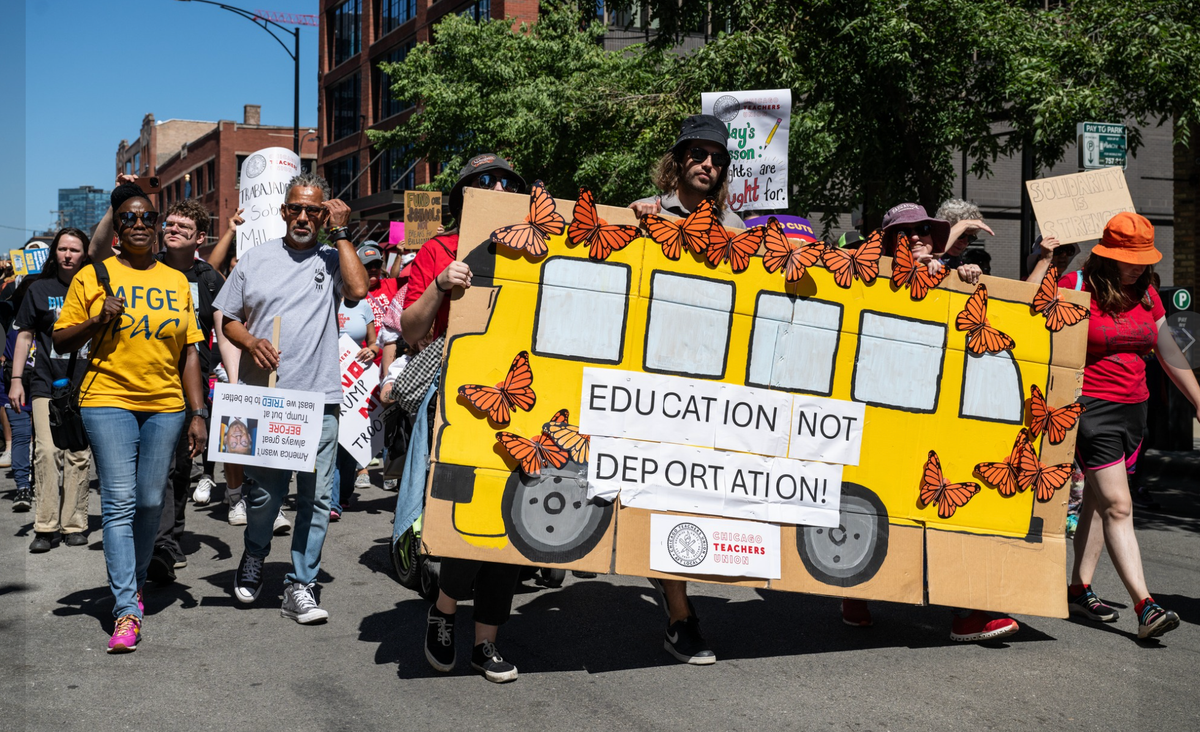Chicago Schools Brace for Immigration Crackdown
While Chicago Public Schools prepares for a heightened ICE presence in town, the U.S. Department of Justice is suing Illinois to end in-state tuition and scholarships for the state's undocumented college students.

In a time of fear, local schools and community groups are organizing to protect CPS students and families from being caught in a dragnet of immigration enforcement using tactics of questionable legality. On Sunday, Homeland Security Secretary Kristi Noem confirmed that additional "resources" are coming to Chicago to enhance Immigration and Customs Enforcement operations.
The impending immigration enforcement surge has put city and state officials on high alert. There's also reason to be concerned that families will keep their children home from school when immigration enforcement tightens. In May, the Chicago Tribune reported that attendance across all of Chicago Public Schools dropped the week of January 20, when President Donald Trump launched his second term by cracking down on immigration and rescinding restrictions on ICE activity near "sensitive locations," including schools. At the top 10 schools with the largest attendance declines, Latine students made up more than half of the student body.
Back in February, the Chicago Board of Education affirmed and updated its resolution not to assist Immigration and Customs Enforcement, including not permitting ICE agents to enter school buildings without a warrant signed by a judge. Last Thursday, Interim CEO/Superintendent Maquline King used her weekly letter to families to provide resources, offer support, and remind families of the importance of regular school attendance.
In her letter, King suggested families work together to ensure safety on the way to and from school, whether by organizing a Walking School Bus, carpooling, or creating buddy systems on public transit. Ensuring the safety of parents at dropoff and pickup is of paramount importance. In the most well-known Chicago example of an adult being arrested by ICE near a school, a father of three was detained after dropping off his children at an Acero Schools building in Gage Park.
At least some Safe Passage workers, who monitor routes to school at schools on the South and West sides, have been trained to watch for and report suspected ICE activity. (The link leads to the CPS web page for Safe Passage, which I hope has been updated since workers were cut over the summer.)
School by school, the Chicago Teachers Union has been organizing sanctuary teams at schools to designate point people who will respond if ICE or other federal agents seek entry or are spotted on school grounds or nearby. Ideally, those sanctuary teams have a designated liaison with their neighborhood rapid response team. But this varies by school and neighborhood.
At the macro level, both the school district and the teachers' union have ties to the immigrant rights organizations that serve as hubs for the many rapid response teams documenting ICE activity. Much of their work is quiet and involves checking out tips and dispelling false rumors of ICE activity. But after federal agents attempted to enter Hamline Elementary in Back of the Yards in January, local community groups connected with rapid response spent a frigid week passing out Know Your Rights information to families at the beginning and end of the school day.
And, at the state level, Gov. Pritzker recently signed the Safe Schools Act, which codifies the right of every child in Illinois, regardless of immigration status, to a free, public education. This right was first established nationally in the 1982 Supreme Court case known as Plyler v. Doe. But immigrant-rights advocates fear that decision could be overturned, and pushed state legislators to enshrine the right in state law.
What you can do
If you see something, say something: report any suspected ICE activity to the Illinois Coalition for Immigrant and Refugee Rights (ICIRR) by calling 855.435.7693.
Federal Lawsuit Threatens In-State Tuition, College Scholarships for Illinois' Undocumented Students
Yesterday, the U.S. Department of Justice filed a lawsuit against the state of Illinois, Gov. JB Pritzker and Attorney General Kwame Raoul that targets state laws allowing qualified undocumented Illinois students to receive in-state tuition and MAP grants for low-income college students. Last month, Pritzker signed legislation that expands and streamlines undocumented students' eligibility for state financial aid. The law goes into effect on January 1, 2026.
Undocumented Illinois students first became eligible for in-state tuition in 2003. In 2019, the RISE Act allowed a subset of undocumented students to access state financial aid as well as institutional aid from Illinois' public colleges and universities.
But the Trump administration is now suing states to force them to roll back financial assistance for their undocumented students to afford college. Like Illinois, Minnesota is currently being sued. In June, Texas ended its in-state tuition program shortly after the federal government sued. Oklahoma followed suit in August, and Kentucky is about to join them.
Comments ()